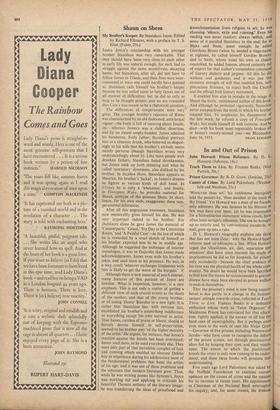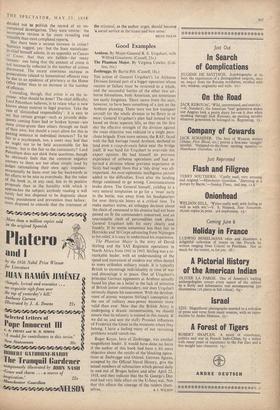In and Out of Prison
John Howard: Prison Reformer. By D. L. Howard. (Johnson, 18s.)
Teach Them to Live. By Frances Banks. (Ma% Parrish,.30s.) 'WHOEVER thou art,' his tombstone inscription told the pasiers-by, 'thou standest at the tomb of thy friend.' Yet Howard was a man of no friends, only admirers. He was famous in his lifetime as few men have ever been; yet he was responsible for a humanitarian movement whose results have often been savagely inhuman. The son he brought up so strictly and, by conventional standards, so well, grew up into a rake.
D. L. Howard's biography explains one thing that has not been clear : why the Howard-based reforms took so antiseptic a line. When Howard urged the 'cleanliness, air, diet, separation and attention' that have since become the staple of imprisonment he did so for hospitals, for prisons only secondarily—because the chief problem of his time was the physical health of the whole corn' munity. No doubt he would haye been horrified to find how the means he recommended to prevent disease have since been elevated in prison welfare to ends in themselves.
That the prisoner's mind is now being remenv bered is due partly to a change in the humani- tarians' attitude towards crime, reflected in Teach Them to Live. Frances Banks is a dedicated enthusiast whose work as 'Tutor Organiser' at Maidstone Prison '.has convinced her that educa• tion, rightly applied, is the answer to all but the hard core of incorrigibility. But it perhaps .owes even more to the work of men like Major Grey, —Governor of five prisons, including Wormwood Scrubs—who have come to recognise the defects of the prison system, not through preconceived ideas but by keeping their eyes, and their minds, open. The extent to which the punishment breeds the crime is only now coming to be under- stood; and these three books will promote that understanding.
Five years ago Lord Pakenham was asked by the Nuffield Foundation to examine current opinions on the causes of crime and the reasons for its increase in recent years. His appointment as Chairman of the National Bank interrupted the inquiry; and, for some reason, the trustees
decided not to publish the record of an un- completed investigation. They were unwise : the incomplete Version is far more revealing and valuable than most completed reports. Has there been a serious increase in crime? Statistics suggest, yes: but the State statistician- in-chief himself admits, in an appendix to Causes of Crime, that they are fallible—for many reasons: one being that the amount of crime is not necessarily reflected in the number of crimes discovered. The recent enormous increase in prosecutions related to homosexual offences may be due to an epidemic of pruriency at the Home Office rather than to an increase in the number of offences.
Conceding, though, that crime is on the in- crease : what should be done? The chief difficulty, Lord Pakenham believes, is to relate what is now known about motives to legal practice. Take the case of 'diminished responsibility': it is easy to say that certain groups—such as juvenile delin- quents coming from bad or broken homes—are more crime-prone than others through no fault of their own; but should a court allow for this in passing sentence in individual instances? To be fair to a psychopath, too, a court may feel that he ought not to be held accountable for his actions : but is this fair to the community? Lord Pakenham does not shirk these questions, though he obviously feels that the common negative answers to them are too often simply used by judges rationalising their own ugly impulses: occasionally he leans over too far backwards in his efforts to be nice to everybody. But the value of the book is, in any case, less in its positive Proposals than in the humility with which it approaches the subject; anybody reading it will surely feel less disposed to be dogmatic about crime, punishment and prevention than before: more disposed to concede that the treatment of the criminal, as the author urges, should become 'a social service in the truest and best sense.'
BRIAN INGLIS



































 Previous page
Previous page